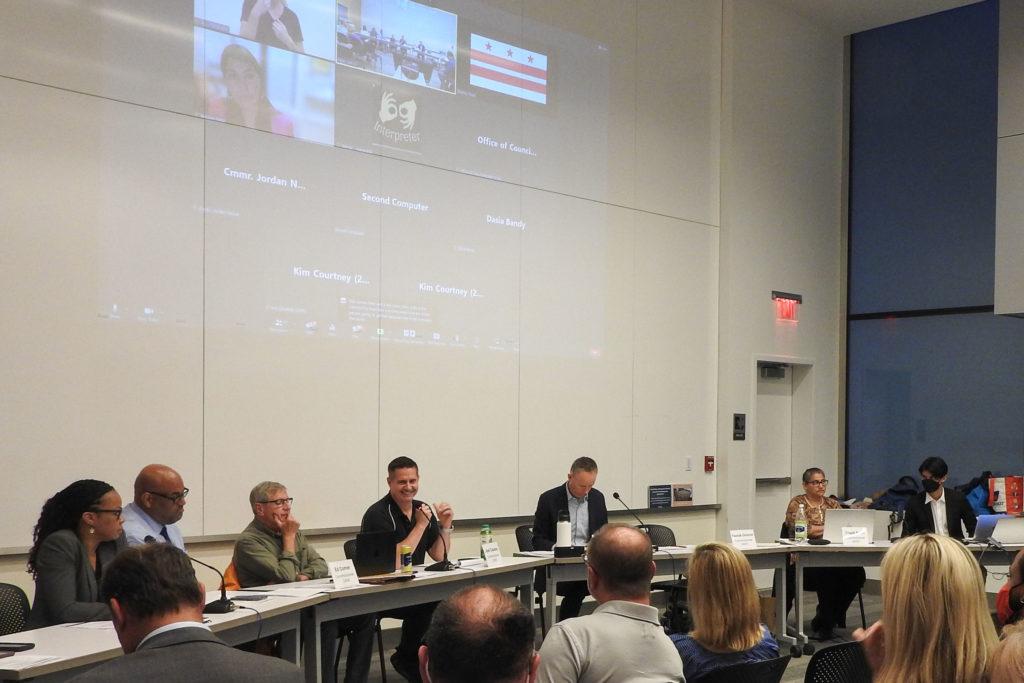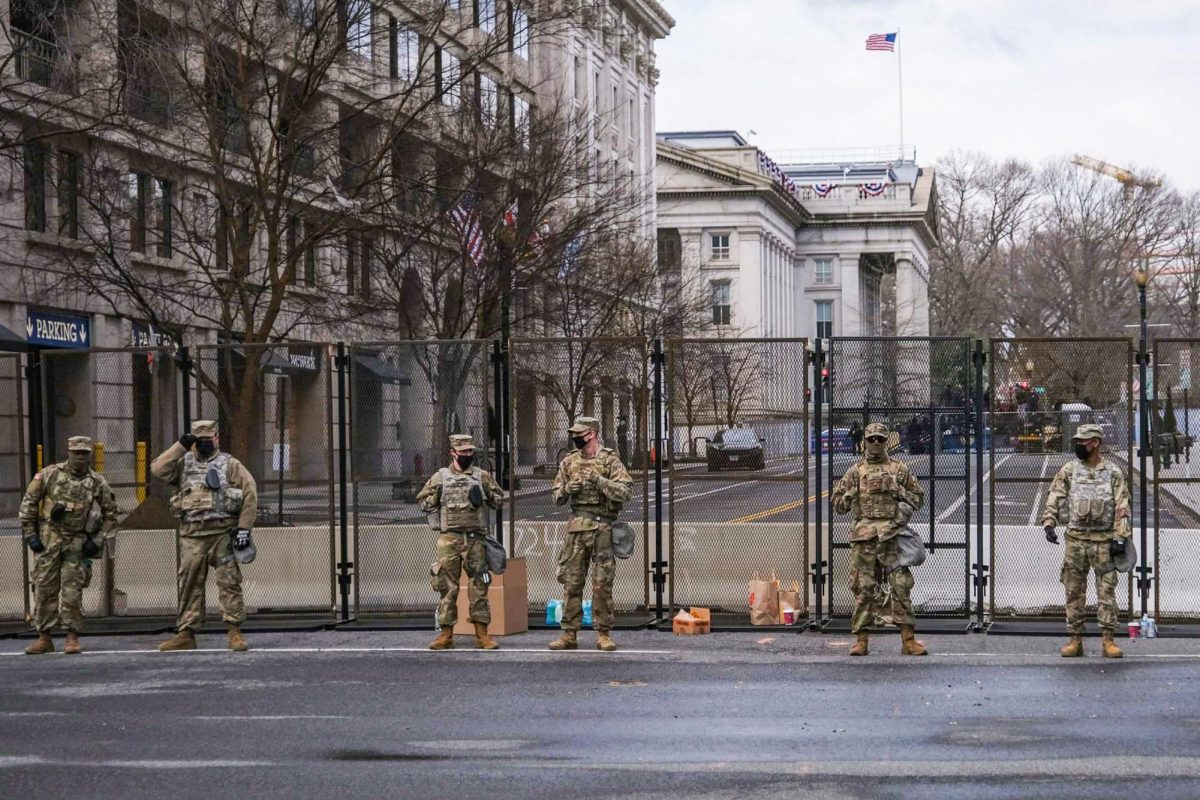Members of a local governing body heard presentations from the Department of Health and Human Services and the Department of Human Services Wednesday on a potential project to buy the Aston building and turn the space into a shelter for unhoused people.
The Foggy Bottom and West End Advisory Neighborhood Commission held a special meeting to seek public comment on DHS’s proposal to convert the Aston, a GW-owned residence hall on New Hampshire Avenue, into a non-congregate shelter, meaning residents have their own rooms. Commissioners and members of the public largely supported the initiative — which is the first of its kind in the District — while some constituents voiced concerns regarding security and a lack of ways to measure the efficacy of the shelter without precedent.
During the ANC’s regular meeting directly after the special meeting, commissioners voted to approve a liquor license transfer for boutique wine shop District Champagne, a restaurant license for Mary’s Café and a plaque installation near the Embassy of Spain.
Here are some of the meeting’s highlights:
Commissioners seek public comment on proposed non-congregate shelter
Rachel Pierre, the interim director of the Department of Human Services, said the proposed shelter in the Aston would provide unhoused residents additional privacy compared to other shelters because it offers separate rooms for residents. She said medically vulnerable people, clients matched to housing resources through the District’s Coordinated Assessment and Housing Placement for Single Individuals program and mixed-gendered adult families — who would otherwise be separated — can stay at the proposed shelter.
Pierre said often, families live in encampments or in their vehicles instead of being separated in a shelter.
“This is why we are very excited,” she said. “We are very excited about filling this important gap in our system.”
Pierre said the Aston could host a maximum of 190 residents. She said the purchase price of the Aston was set at $27.5 million, with $19 million coming from the Department of Housing and Urban Development’s American Rescue Plan funding. University officials first announced plans to sell the Aston last May.
David Ross, the chief of staff in the Department of Human Services, said proposed renovations to the Aston — including replacing carpet with vinyl flooring, upgrading security and IT, repairing the underground garage and deep cleaning the space — should take about eight weeks. Residents of the Aston previously experienced frequent water outages and lapses in building security.
Ross said if the project is approved, residents should move into the Aston in October or November.
Genevieve Hulick, Ward 2 Council member Brooke Pinto’s chief of staff, said Pinto filed a disapproval resolution on the contract to acquire the building to allow the public their full allotted time to submit public comments. She said D.C. Mayor Muriel Bowser’s notice regarding the purchase invited public comment until July 5, but if the proposed contract went through the D.C. Council without any action, it would have been approved Thursday.
“The council should wait to act upon those contracts submitted by the mayor until the ANC comment period has completed and such feedback can be considered,” Hulick said. “Similar property acquisitions have allowed the comment period to end prior to the contract being submitted to and acted upon the council.”
Nayan Patel, president and CEO of District Hospitality that controls the West End Hotel adjacent to the Aston, said he is concerned about residents with mental illnesses deterring customers from the hotels and restaurants in the area, like the Ritz-Carlton and Michelin-starred restaurant Imperfecto. He asked what safeguards DHS might propose to protect local businesses in the area following the Aston’s conversion to a shelter for people experiencing homelessness.
“While it’s not popular to consider the tourists that frequent our community, restaurants and hotels primarily operate on your reputation,” Patel said. “That reputation travels really quickly online.”
Pierre said just because the shelter will serve unhoused people does not mean it will “automatically” have residents with severe mental illness.
Commissioners approve liquor license transfer, restaurant license, public installation at the Embassy of Spain
The owners of District Champagne presented their application to transfer their liquor license from their location at 1301 9th St NW to a new location at 2400 M St NW, the former West Wing Cafe. Commissioners voted 7-0-2 to approve the transfer and allow the store to sell beer, wine and spirits Monday through Saturday 10 a.m. to 9 p.m. and Sunday 10 a.m. to 7 p.m.
Commissioners voted 6-1-2 to approve a Class C restaurant license for Mary’s Café at 2554 Virginia Ave, allowing it to sell alcoholic beverages.
The ANC approved the construction of a small concrete plaza to move a sculpture of Bernardo de Gálvez — a friend of George Washington who fought in the Revolutionary War — to the front of the Embassy of Spain facing Pennsylvania Avenue and 24th Street. Commissioners voted 7-0-2 to create the plaza, reshape the nearby fence and construct an informative plaque.
Commissioners did not approve any specific language accompanying the project.
ANC approves renovation and expansion of plastic surgery facility
Paul Ruff, founder of West End Plastic Surgery, presented a proposal to expand the facility, adding a surgical facility with four operating rooms. He said the expansion will help the facility meet “growing client demand.”
Commissioners voted 7-0-2 to expand the facility from 7,374 square feet to 9,220 square feet.
ANC denounces D.C. Council drunk driving bill, opposes bill incentivizing restaurant service charges
Commissioners approved a resolution encouraging the D.C. Council to oppose the Dram Shop Clarification Amendment Act of 2023. The act would cap the civil damages an individual can seek against an intoxicated patron of a bar or restaurant at $250,000, and it would prohibit servers and bartenders from serving patrons who are “obviously intoxicated.”
The ANC voted to approve a resolution opposing the bill because it would place “the burden of judgement” on servers and bartenders to determine whether patrons are intoxicated. The resolution states the bill would make it more difficult for individuals to bring forward injury claims due to drunk offenders.
2A03 Commissioner Trupti Patel, who introduced the resolution, said the bill would put bartenders and servers “in ethical dilemmas” when deciding whether to serve patrons.
“It actually makes it next to impossible to pursue civil action against the drunk driver or the establishment,” she said.
Commissioners voted 5-2-2 to approve the resolution, with Malec and Courtney in opposition.
Patel also introduced a resolution asking the council to adjust the Workers and Restaurants Are Priorities Act of 2023. The act would incentivize restaurants to implement service charges, require third-party delivery apps include restaurants more than four miles away from a customer in search results and establish a new timeline to eliminate tipped minimum wage.
Patel said under the proposed legislation, restaurant operators could use funds from service charges however they liked, and the funds did not need to go to workers.
The ANC’s resolution states that the council should adjust the act to “encourage or require” workers receive the entirety of service charges to supplement their base pay and “strengthen restaurants’ obligations to clearly explain service charges to customers.” Commissioners voted to approve the resolution 3-2-4, with Courtney and Nassar in opposition.








